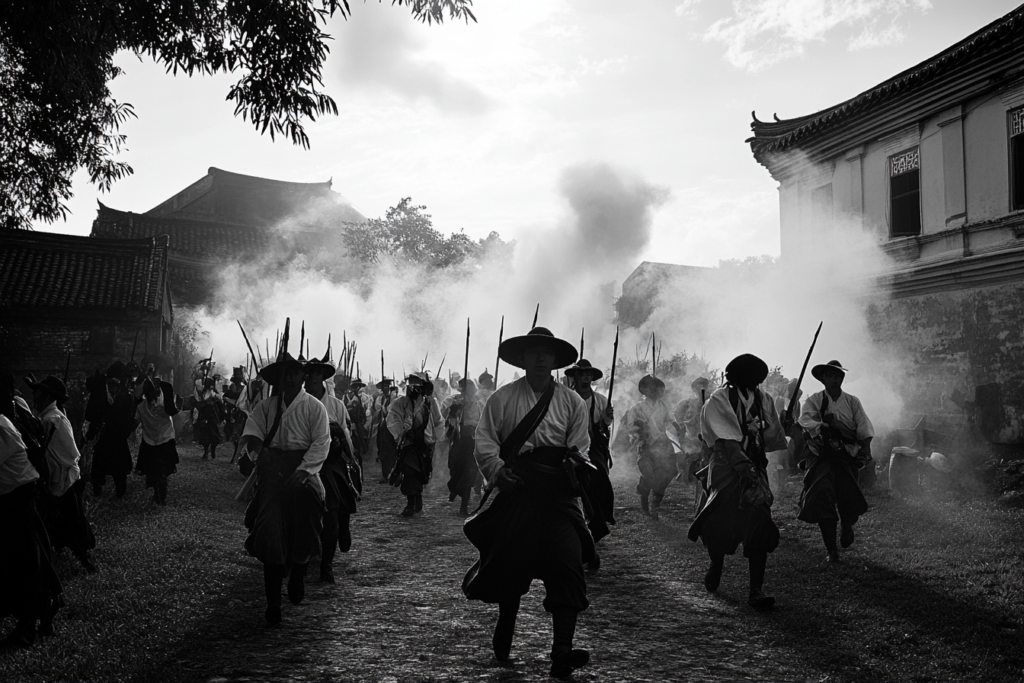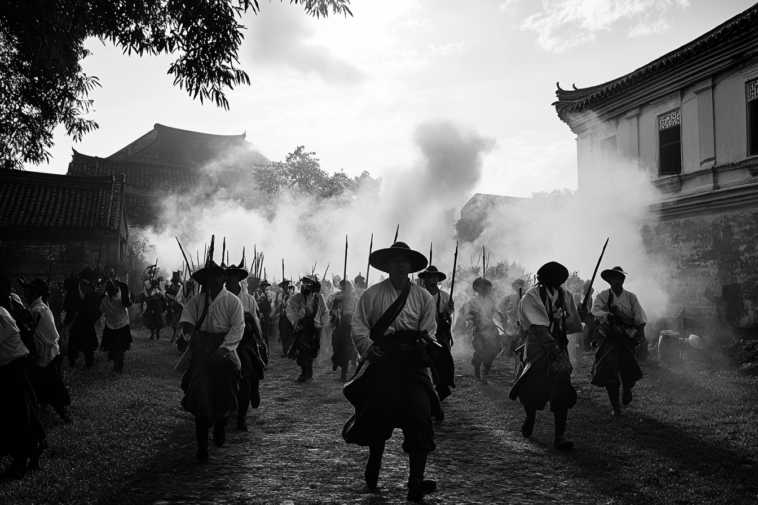
When we think of the deadliest conflicts in history, the World Wars or the Mongol invasions often come to mind.
But there’s one war that claimed more lives than almost any other—the Taiping Rebellion (1850–1864).
This Chinese civil war resulted in a staggering 20–30 million deaths, yet many in the West know little about it.
Led by a man who claimed to be the younger brother of Jesus Christ, this movement nearly toppled the Qing Dynasty.
So, what happened, and why was it so devastating?
What Was the Taiping Rebellion?
Who was Hong Xiuquan?
The Taiping Rebellion was led by Hong Xiuquan, a man from southern China who had failed the civil service exams—a key path to success in his time.
After a series of visions, Hong became convinced he was the younger brother of Jesus Christ, sent by God to overthrow the Qing Dynasty and create a new “Heavenly Kingdom” on Earth.
His beliefs were a mix of Christianity and his own interpretations, which set the stage for one of history’s most dramatic uprisings.
- Read also: The Fight for Equality: Essential Civil Rights Movement Facts
- Read also: Unveiling History: Civil War vs Revolutionary War
What did he want?
Hong wanted to completely transform Chinese society.
He aimed to replace traditional beliefs like Confucianism, Buddhism, and Daoism with his version of Christianity.
His vision included a utopian society where everyone shared property, followed strict moral rules, and lived in equality.
He also introduced radical reforms for the time, such as ending foot-binding, promoting some level of gender equality, and banning opium.
These ideas were revolutionary in 19th-century China and appealed to many who were tired of the old ways.
Who joined him?
Hong’s message resonated with millions of people, especially poor peasants who were struggling under the Qing Dynasty’s harsh rule.
His movement attracted farmers, miners, and even some educated scholars who were frustrated with the system.
At its peak, Hong’s army grew to an estimated one million soldiers, making it a massive and powerful force.
People joined not just for his religious ideas, but also for his promises of a fairer and more equal society.
When and where did it happen?
The rebellion began in 1850 in Guangxi province and quickly spread across southern and central China.
In 1853, the rebels captured Nanjing, a major city, and declared it their capital, renaming it the “Heavenly Capital” (Tianjing).
For over a decade, the Taiping Rebellion shook China to its core, becoming one of the deadliest conflicts in human history.

Why Was It So Bloody? (The Brutality)
Scale of the conflict
The Taiping Rebellion wasn’t just a small uprising—it was a massive, full-scale war.
It lasted 14 years and spread across 16 of China’s 18 provinces. Entire cities were destroyed, and millions of civilians lost their lives.
By the time it ended, the death toll was higher than that of the Napoleonic Wars, making it one of the deadliest conflicts in history.
The fighting
Both sides fought with extreme brutality.
The Taiping soldiers used guerrilla tactics, large-scale sieges, and carried out massacres.
The Qing army responded with equal violence, often killing entire communities suspected of supporting the rebels.
The fighting was relentless and devastating, leaving a trail of destruction across the country.
Religious fervor
Hong Xiuquan’s intense religious beliefs added fuel to the violence.
He saw himself as a divine figure and ordered the execution of anyone who resisted his vision.
His followers believed they were fighting a holy war, which made them even more ruthless in battle.
This religious zealotry turned the conflict into a fight not just for land, but for souls.
Government response
The Qing Dynasty was already weakened by corruption and pressure from foreign powers, so it struggled to stop the rebellion at first.
Over time, though, the Qing raised powerful regional armies, like the Hunan Army led by Zeng Guofan.
These forces played a key role in eventually defeating the Taiping rebels, but not without immense bloodshed.
Outside involvement
Western powers like Britain and France initially considered supporting the Taiping rebels because they opposed the Qing Dynasty.
However, they eventually sided with the Qing, worried that a Taiping victory would create chaos in China and hurt their trade interests.
This foreign involvement added another layer of complexity to the conflict.

Key Events and Turning Points (The Timeline)
Early successes
By 1853, the Taiping army had achieved a major victory by capturing Nanjing, a key city on the Yangtze River.
They declared it their capital, renaming it the “Heavenly Capital” (Tianjing), and established control over a large part of southern and central China.
This early success showed their strength and gave them a solid base to expand their influence.
The peak of power
At their strongest, the Taiping rebels governed a huge territory with tens of millions of people under their rule.
They even tried to march north to capture Beijing, the Qing Dynasty’s capital, but failed.
Despite this setback, their control over much of southern China made them a serious threat to the Qing government.
Internal problems
As time went on, the Taiping leadership began to fall apart.
Hong Xiuquan grew increasingly paranoid and started executing his own commanders.
Corruption spread within the movement, and morale among the rebels dropped.
These internal struggles weakened their ability to fight effectively and maintain control over their territory.
The government fights back
The Qing Dynasty, with help from Western-trained forces like Frederick Townsend Ward’s “Ever Victorious Army,” launched a strong counteroffensive.
In 1864, Qing forces finally recaptured Nanjing, the Taiping capital. Hong Xiuquan died around the same time, possibly by suicide or poisoning, marking the end of the rebellion.

The Aftermath and Impact (Why It Matters)
The cost of the war
The Taiping Rebellion was one of the deadliest conflicts in history, with at least 20 million people losing their lives.
Most of these deaths were caused by the fighting itself, as well as the famine and disease that spread during the war.
The scale of destruction was enormous, leaving entire regions in ruins and countless families devastated.
Weakening the Qing Dynasty
Although the Qing Dynasty managed to survive the rebellion, it was left severely weakened.
The war drained the empire’s finances and resources, and the loss of so many lives left the population exhausted.
This made the Qing vulnerable to further internal uprisings and increased pressure from foreign powers, who took advantage of China’s weakened state.
Long-term effects
The Taiping Rebellion had a lasting impact on China’s history.
It forced the Qing Dynasty to modernize its military and consider reforms to prevent future rebellions.
The rebellion also inspired later revolutionary movements, including the Chinese Communist Revolution, as it showed the power of mass uprisings against an oppressive system.
In many ways, the Taiping Rebellion set the stage for the dramatic changes that would shape modern China.
- Read also: Unveiling the Secrets: 10+ Facts About the Ming Dynasty
- Read also: Exploring the Magnificence: Ming Dynasty Time Period

Final Thoughts
The Taiping Rebellion serves as a powerful reminder of how deeply ideology, inequality, and poor governance can fuel devastating conflicts.
While it may not be widely remembered outside of China, its impact continues to shape the country’s history and lessons learned from that era remain relevant today.
FAQs
Western historians often focus on conflicts involving Europe and America. Additionally, China’s historical records were heavily controlled, limiting outside awareness.
He claimed to be the younger brother of Jesus Christ and sought to establish a theocratic state based on his interpretation of Christianity.
After years of infighting and external pressure, the Qing Dynasty, with foreign support, crushed the rebellion. Nanjing fell in 1864, marking the end of the movement.
While the rebellion ultimately failed, it forced the Qing Dynasty to modernize and set the stage for future revolutions in China.


